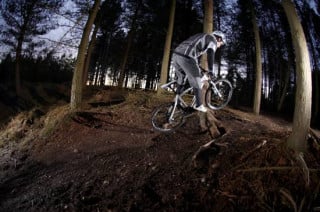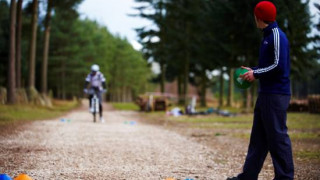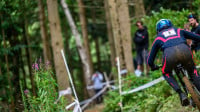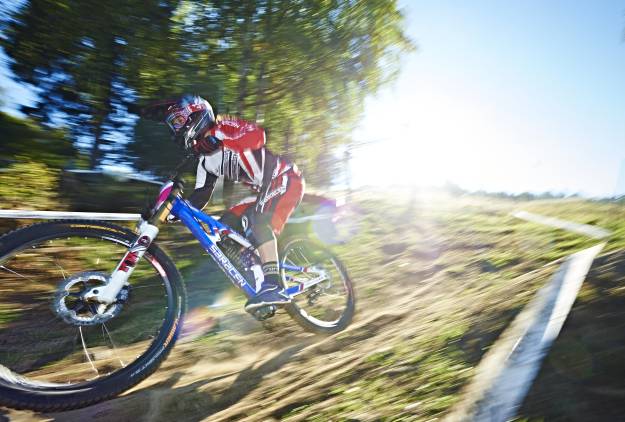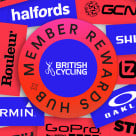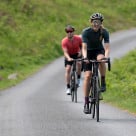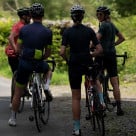![]() Follow britishcycling.org.uk on
Follow britishcycling.org.uk on ![]()
![]()
![]()
![]()
Behind the Scenes with Coaching and Education:
Developing British Cycling's Mountain Bike Coaching Award
Posted February 26 2010
Words And Photography: Luke Webber
British Cycling's Coaching and Education department is responsible for creating a coaching structure for cycling and training coaches. Luke Webber talks to Charlie Evans, a Coaching and Education Officer for the department who has been developing British Cycling's upcoming Level 2 Certificate in Coaching Mountain Biking. They discuss British Cycling's coaching pathway, the development of the mountain bike award and what it means for mountain biking in the UK.
British Cycling's Coaching and Education Department is tasked with developing an effective coaching structure for cycling. This includes creating a coaching pathway for six cycling disciplines at three coaching levels. The disciplines include Road and Time Trial, Track, BMX, Mountain Biking, Cycle Speedway and Cyclocross. Currently Road and Time Trial and Track are complete to Level 3. Development of the Level 3 BMX Coaching Award is underway and the Level 2 Mountain Bike Award is in the latter stages.
We spent two days on a photo shoot for the Level 2 Mountain Bike coaching handbook alongside Charlie Evans, Scott Beaumont and Nick Craig, before finding out a little more from Charlie about the different coaching awards mean and what the resulting publication will mean for mountain bikers in the UK.
LW: Can you outline BC's Coaching Structure and give us a quick description on how they work?
CE: Sure. Up to Level 2, the coaching awards enable coaches to deliver technique based coaching to groups of riders. The Level 1 and Level 2 Certificates in Coaching Cycling (CCC) are designed to provide candidates with general coaching skills, therefore the techniques they cover apply to every cycling discipline. From Level 2 coaches can learn how to apply these skills in the discipline specific environment, delivering more advanced discipline specific techniques to groups of riders. This is the aspect we have been working on with the Level 2 Certificate in Coaching Mountain Biking. Level 3 enables coaches to deliver even more advanced techniques to their riders, while enabling them to prescribe individual training plans to riders.
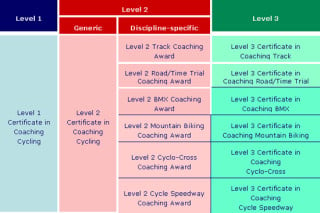
LW: When was the British Cycling mountain bike coaching system conceived?
CE: Mountain biking has been on the plan since the inception of the Coach Education structure, however having six coaching awards to develop from nothing through to Level 3 takes time. The format for the mountain bike pathway follows the same structure as the other courses, building on what the candidate coaches have learned during the Level 2 CCC. We began developing the Level 2 for mountain biking last July, and the plan is for us to roll straight through into the Level 3 Award post-launch.
LW: What does creating a mountain biking coaching resource involve; where has the inspiration come from to create this guide and why do you feel it was needed?
CE: As with all our courses, course development involves making all the course resources and designing the learning programme for the award. We have to make course handbooks, which provide candidates with all the information they need to take out into the field. Handbook production involves authoring, editing, reviewing text as well as sourcing images and diagrams. The course delivery involves deciding the course modules, activities and delivery methods as well as the assessment strategies. The course delivery for Level 2 discipline specific courses is two days, and there is typically a lot to include. It is important to ensure we have developed the most effective way to communicate the key coaching messages to our candidate coaches, as well as inspiring them to take that message on to their riders.
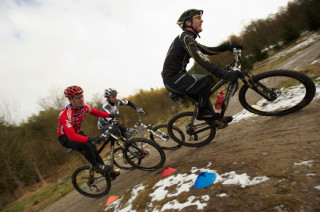
LW: Who has been instrumental in deciding the content for the Level 2 Award?
CE: When we create a coaching course, we develop a project workgroup consisting of experts from that discipline. For example on the Level 2 BMX award the work group consisted of Jamie Staff and Dylan Clayton. We therefore don't just rely on the knowledge within the department to create an award. The main role of the work group is to sit down and decide the technical syllabus - what the key techniques are for each coaching level and what the coaching points are within each technique.
The mountain bike work group was of equal authority to the BMX, consisting of World Cup cross-country racer Nick Craig, World Cup downhill and four-cross racer Will Longden and mountain bike instructor Craig Scott. Each brought a different perspective to the project, which was essential to creating a well rounded coaching course.
I have been working on the project from the start. After I had set-up a work group my colleague Sarah Cleall-Harding came on board and together we have led the project. We brought quite different perspectives which is great for the award. Having raced cross country for a number of years I brought a technical perspective and understanding of mountain biking, enabling me to question technical details and get the right people involved with the project. Sarah, who does not have a background in mountain biking but is experienced in coaching, was able to ensure that the informationproduced could be used by coaches who are new to the environment.
When it came to sourcing images to demonstrate the techniques covered in the resources it was especially important to ensure that they were technically accurate. We therefore called upon the experience of British four-cross Champion and World Cup four-cross rider Scott Beaumont. Other contributors to the resources include Phil Dixon (National Mountain Bike Coach), Martyn Salt (British XC series and Dalby World Cup organizer) and Alan Williams (Great Britain/Sky Mechanic) to name a few.
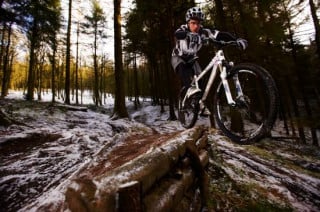
LW: What is the basic format of the mountain bike coaching system?
CE: The Level 2 and 3 awards will cover the disciplines of cross country, downhill and four-cross.
The Level 2 award will enable coaches to deliver mountain bike techniques to groups of riders. The techniques such as front wheel and rear lifts, bunny hopping and basic jumping covered at Level 2 apply to all disciplines. The work group agreed that at Level 2, riders need a solid grasp of how to ride a mountain bike before introducing specialist techniques from any of the mountain bike disciplines. Level 3 will therefore provide information on those specialist, more advanced techniques, as well as enabling coaches to provide one-to-one training prescription to riders for each discipline. Candidates will be able to progress onto the Level 3 following completion of the Level 2 discipline specific award.
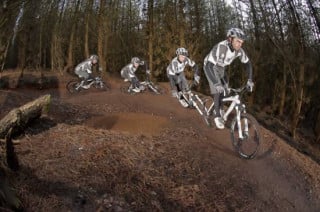
LW: So the focus of all Level 2 MTB Award is technique development?
CE: Yes, that's right. We are aiming to show coaches how to coach mountain bike techniques. It is much more than just telling what to coach. The award aims to give coaches the skills and confidence to go out and improve their riders' technical performance.
LW: When is the launch for the Award?
CE: We will be looking at a launch sometime in the summer of this year.
LW: What will this coaching guide and resulting accreditations mean for mountain bike coaching in the UK?
CE: Although there may be other mountain bike coaching qualifications out there, I do not believe anything has been produced to the same standards as this award. We are in a fortunate position where we can produce very high quality resources and offer our candidates excellent support both during and post course.
The award will provide an effective pathway for coaches interested in mountain biking to develop their skills. For riders it will mean that the standards and quality of mountain bike coaching will be improved. With coaches trained to the same standards, riders can expect a level of consistency within the quality of the coaching support available. Raising the standards in cycle coaching is the whole point of what we are doing in Coaching and Education. The aim is to get the right coaches out there with the right skills to inspire riders and raise the standards of their performances.
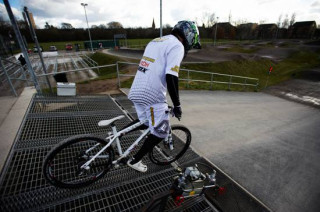
LW: What will this coaching guide and resulting accreditations mean for mountain biking in the UK?
CE: It should help to improve the standard of riding and coaching. But also it shows that mountain biking is on the British Cycling agenda.
LW: How can I become a British Cycling Accredited mountain bike coach and get the material? What are the prerequisites to get on the course?
CE: Candidates need at least a Level 2 CCC qualification, however candidates who hold either the older Club Coach or Activity Coach Qualifications (offered prior to the introduction of the Level 2 CCC) are eligible to attend.
LW: How do I get on the courses or find out if there is one in my area?
CE: The dates for the Level 2 mountain bike award have not been released yet, however dates for our Level 1 and 2 courses can be found on our website.
LW: How many people (and what kind of audience) are you anticipating will have interest in the course?
CE: We have had a significant amount of interest already and I expect course demand to be high.
As with our other Discipline specific awards, the course is performance/competition related, however the difference with mountain biking is that even riders who don't compete want to improve their technique - I think this may be where mountain bike coaching differs significantly from track, road and even BMX - it just got a broad interest base. Therefore I think demand will be very high.
LW: When do you think there will be a direct, measurable impact on mountain biking in the UK as a direct result of these resources?
CE: Obviously -the number of mountain bike coaches trained is measurable. Knowing how active each coach is and how many riders each deals with provide some idea as to how much impact the programme will have. Ultimately how direct the impact is depends on how active, knowledgeable and inspired the coaches are to engage their riders. I am confident we are providing them with a world class coaching resource and that can only be good for mountain biking.
Certainly not all riders that are coached will compete, however, if the standards of those that do is raised then that is going to make for a healthier competitive scene. If the Level 2 coaches can engage young riders, building on momentum from the Go-ride (and specifically the Go-ride racing programme) generating riders that are skilful and well-rounded will make the pool of riders seeking Talent Team, Olympic Development and Olympic Academy places significantly bigger. A medal from a new rider in a major championship would clearly be a direct and measurable impact. Let's see what the next few years bring...
